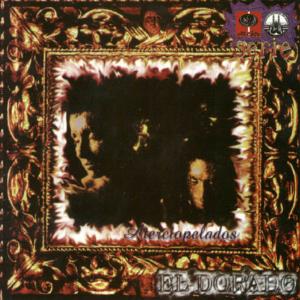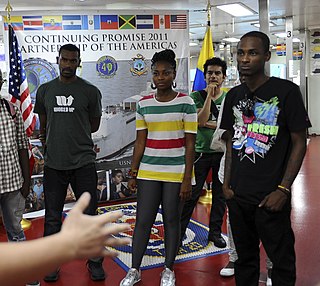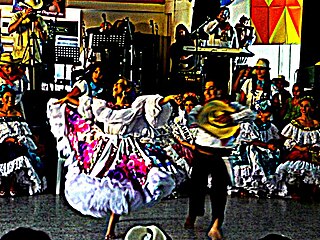Related Research Articles

The music of Colombia is an expression of Colombian culture, music genres, both traditional and modern, according with the features of each geographic region, although it is not uncommon to find different musical styles in the same region. The diversity in musical expressions found in Colombia can be seen as the result of a mixture of Amerindian, African, and European influences, as well as more modern American.
Aguinaldo It is a genre of Puerto Rican and Venezuelan traditional and cultural music, popular in several Latin American countries., based on Spanish Christmas carols or villancicos which is traditionally sung on Christmas itself or during the holiday season. Aguinaldo music is often performed by parrandas - a casual group of people, often family or friends, who merrily go from house to house taking along their singing. The instruments used are the cuatro, maracas and drums. Some popular aguinaldos are Burrito Sabanero (Venezuela), El Asalto, Feliz Navidad, and De la Montaña Venimos.

Leonor González Mina was an Afro-Colombian musician and actress, known as "la Negra Grande de Colombia". She is known for her work in several genres of Colombian music, including bolero, pasillo, bambuco, and especially cumbia. She is known for songs such as "Mi Buenaventura", "Navidad Negra", and "Yo Me Llamo Cumbia".

Afro-Colombians, also known as Black Colombians, are Colombians who have predominantly or total Sub-Saharan African ancestry. They stand out for having dark skin. In the national censuses of Colombia, black people are recognized as 3 official groups: the Raizals, the Palenques and other Afro-Colombians.

El Dorado is the second studio album released by Colombian rock group Aterciopelados, released on October 24, 1995 through Sony BMG. The album was produced by Federico López and recorded at Audiovisión in Bogotá, Colombia.

Bomba Estéreo is a Colombian band founded in Bogotá in 2005 by Simón Mejía. Their music has been described as "electro tropical" or "psychedelic cumbia".

María Rodrigo was a Spanish pianist and composer. She was the daughter of Pantaléon Rodrigo, and studied music at the Madrid Conservatorium under José Tragó for piano, Valentín Arín for harmony and Emilio Serrano for composition. Maria was the first woman to have her opera performed in Spain. Her sister Mercedes Rodrigo was equally intelligent, being the first woman from Spain to obtain a degree in psychology from the Rousseau Institute in Geneva. The two left Spain for Switzerland during the Spanish Civil War, moved in 1939 to Bogota, Colombia, at the invitation of rector Agustín Nieto Caballero, and in 1950 to Puerto Rico at the invitation of José María García Madrid. With Pablo Casals, Rodrigo founded the Puerto Rico Conservatory of Music. She died in Puerto Rico in 1967. Maria was one of the few composers that addressed the composition of zarzuelas, a genre of Spanish music.

ChocQuibTown is a Colombian hip-hop group that fuses various musical genres. Although the band formed in Cali, the members are originally from the Colombian department of Chocó. The group consists of Carlos "Tostao" Valencia (rapping), Gloria "Goyo" Martínez, and Miguel "Slow" Martínez. The band's music draws influence from a wide variety of modern genres including hip-hop and more recently electronica, combined with traditional Colombian genres including salsa, Latin jazz, and Afro-Latin rhythms.

El Sanjuanero, often called simply Sanjuanero, is a traditional Colombian bambuco song. Its music was written in 1936 by Anselmo Duran Plazas and its lyrics were written by Sofía Gaitán Yanguas. It was first performed on July 12, 1936. and recorded for the first time in the 1950s by the duo Garzon y Collazos. It's one of Colombia's most recognizable folkloric songs, and it is the anthem of the Festival Folclórico y Reinado Nacional del Bambuco.

Alexander Cuesta-Moreno. Bassist, Guitarist, Multi-instrumentalist, Choir and Band Conductor, Producer, Arranger and Composer.

Pombo Musical is a children's album produced by Colombian recording artist Carlos Vives, as a musical tribute to the Colombian writer and poet Rafael Pombo. It was released on August 13, 2008, under Vives' label Gaira Música Local. The album came into fruition when Rafael Pombo Foundation president Juanita Santos asked Vives to craft a musical that uses Pombo's most iconic poems and fables he created. Its music incorporates a variety of Colombian folk genres and mixes in contemporary genres like Latin pop and pop rock. Among the 14 tracks present in the album, only one was released as a single, "El Modelo Alfabético". All the lyrics were written originally by Rafael Pombo, and produced by Vives. Pombo Musical was well-received, and was certified platinum in Colombia by the Asociación Colombiana de Productores de Fonogramas (ASINCOL). It also won some accolades, including a Latin Grammy Award for Best Latin Children's Album, and a Premio Shock for Best Compilation.

Cumbia is a folkloric genre and dance from Colombia.

"La Bicicleta" is a song by Colombian singer and songwriters Carlos Vives and Shakira, from the former's fifteenth studio album Vives (2017) and is also included as an album track on Shakira's eleventh studio album El Dorado (2017). The song was written by both singers, and produced by Andrés Castro and it marks Shakira's first collaboration with a fellow Colombian artist. "La Bicicleta" was intended to be representative of both singers' homelands musical styles in Colombia. It is a song with a mixture of various musical genres – vallenato, pop and reggaeton – and it features indigenous Colombian wind instruments and accordions. Lyrically, it is a nostalgic song, describing the duo's excursion on bikes to places of their childhood. Music critics reviewed the song positively, praising it for its catchiness and inclusion of various Colombian music elements. The song won two Latin Grammy Awards at the 17th Latin Grammy Awards for Song of the Year and Record of the Year.
Cimarrón is a Colombian musical group of festive dance music joropo from the plains of the Orinoco River. This Grammy-nominated band makes Latin music with Andalusian, Indigenous American native and African roots. Their music includes four-stringed cuatro, harp, maracas, and also Peruvian-flamenco cajón, Brazilian surdo, afro-Colombian tambora, a stomp dance as a percussion component and tribal indigenous whistles.
"La Guaneña" is a Colombian song in the bambuco genre. The song is attributed to Nicanor Díaz. In its list of the 50 best Colombian songs of all time, El Tiempo, Colombia's most widely circulated newspaper, ranked it No. 1 as the best Colombian song of all time and called it the first bambuco.
"Soy Colombiano" is a Colombian song in the bambuco style written by Rafael Godoy. It was first recorded in 1945 by Eduardo Armani and his orchestra.
"Alicia Adorada" is a Colombian song written and performed by Juancho Polo Valencia.
"Cuatro Preguntas" is a Colombian song in the bambuco genre written by Pedro Morales Pino and Eduardo López.
"La Ruana" is a Colombian bambuco song written by José Macías y Luis Carlos González. It was popularized in a recording from the 1950s by Obdulio y Julián.

Victoria Eugenia Hernández Urrea, better known as Victoria Sur, is a Colombian singer, musician and composer born in Armenia, Quindío. In 2021 she was nominated for the Latin Grammy Awards in the category of Best Latin Children's Album, for her record Nanas consentidoras.
References
- ↑ "Cuatro preguntas". El Espectador. May 11, 2017. Archived from the original on March 19, 2022.
- ↑ "Las 50 mejores canciones de Colombia". El Tiempo. March 13, 2013. Archived from the original on June 4, 2024.